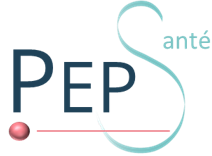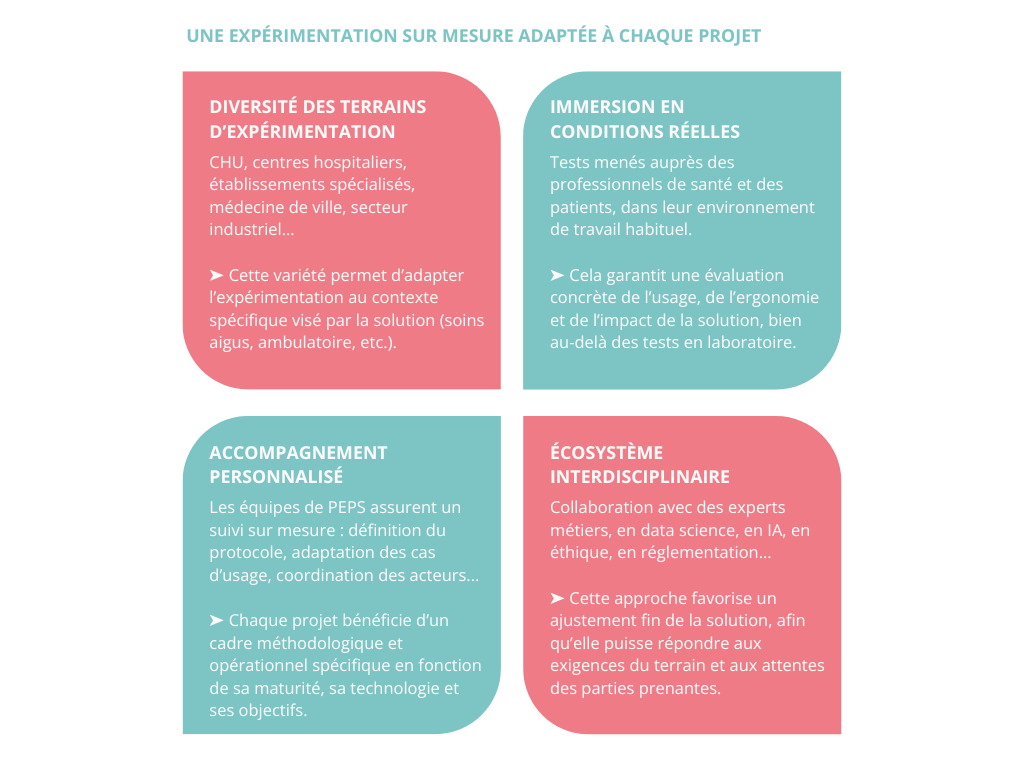Tiers lieu : PETILLANTe Santé (PEPS)
Supported by: CHU de Reims
Main consortium members: Institut d'Intelligence Artificielle en Santé (IIAS) and PETILLANTeS, Centre Hospitalier Auban Moët Epernay, SOS Médecins France, Quest for Health, Société Kernel, Société Axon Cable, CH de Troyes.
The TLE PEPS, the first generalist TLE for AI in healthcare in France, offers a unique service, designed to confront AI innovations with the reality of the field. This facility enables solutions to be tested under real conditions, with patients and professionals, on several experimental sitesto assess their reliability, performance and robustness. In the case of PEPS, acceptability and medico-economic benefit are also independently assessed, with one ambition: to make reliable, trusted and accessible Healthcare AI available. To achieve this, PEPS relies on the Reims University Hospital, IIAS and the PETILLANTeS incubator.


The Tiers lieu service offering
The TLE PEPS comprises 8 main missions:
- Prospecting for new projects and experimental ground.
- Diagnosis and selection of projects.
- Pre-maturation.
- Methodological development and activation of experimental ground.
- Conduct and monitoring of experiments, analysis of results.
- Maturation pre-industrialization.
- Accompaniment with valorization.
- Animation of the ecosystem of digital and AI players in healthcare.
Experimentation sites adapted and mobilized according to each project.
The PEPS project provides 5 initial testing grounds:
- the Reims University Hospital (users and professionals),
- the Epernay Hospital,
- the Troyes Hospital,
- all 63 associations of SOS Médecins France,
- employees of Axon'Cable and its subsidiaries.
3 levels of experimentation for optimal labeling
The evaluation of AI tools in Healthcare carried out within PEPS is broken down into three parts:
- evaluation of the human, societal and organizational impact of AI tools: experimentation is carried out in real-life conditions, with the direct involvement of healthcare professionals and patients, favoring co-design and ongoing adjustment of the solutions tested.
- Performance evaluation: experiments test the robustness and reliability of the tool under real-life conditions.
- Medicoeconomic evaluation: at the end of the experiment, the results validate the relevance of the solution, resulting in the economic arguments needed for marketing.
This TLE PEPS aims to cover a vast field of healthcare themes thanks to the broad expertise of the IIAS scientific team and expert partners, but also thanks to a range of experimental sites. All pathologies addressed by AI solutions are considered in this program. But solutions dedicated to the care pathway, prevention, improving practices and optimizing healthcare resources are also taken into account.
The TLE PEPS is a multi-thematic experimentation and evaluation facility for AI solutions for healthcare, drawing on both artificial intelligence expertise within IIAS and healthcare expertise thanks to healthcare professionals at the CHU de Reims and partners including SOS Médecins France. It can also draw on the expertise in business development and entrepreneurial support provided by the PETILLANTeS incubator and Quest for Health.
Tiers lieu d'expérimentation projects
Project 1: Axodiab
Supplier: Axon'Cable
Solution: AXODIAB is a solution dedicated to diabetes healthcare professionals that enables the management of type 2 diabetic patients on multi-injection regimens (Basal- Bolus).
Need: Determine the optimal insulin dose required to prevent hyper- and hypoglycemic events, particularly in elderly patients, taking into account frailty and their individual therapeutic goals.
Contribution of Reims University Hospital: Validation of the solution through evaluation on a broad spectrum of patients: multiple experimental sites, industrialization.
Project 2: AI4OP
Supplier: SOS Médecins France
Solution:Decision support algorithm for unscheduled medical assessments in outpatient clinics, enabling referral to the most appropriate care pathway, in particular whether or not to resort to unscheduled hospitalization.
Need: Optimization of the healthcare system through proper patient referral to hospital emergency departments with regard to the population's need for unscheduled care (SNP).
Reims University Hospital's contribution:
- Evaluation and validation of the module in operational medical tools.
- Evaluation of the tool's place in medical processes for setting up the patient care pathway.
- Formalization of the module's integration standards in the various patient management tools.
- Implementation of infrastructures for wide deployment of the tool.
- Evaluation of resources to ensure operational availability of the tool.

